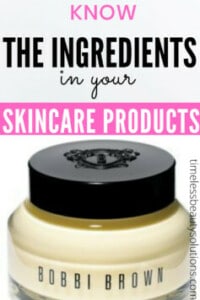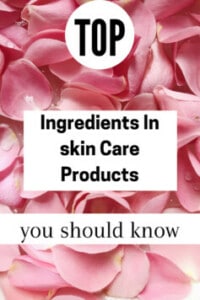Have you found yourself reading at ingredients in skincare products and not knowing what they are or their uses? then this post is for you.
Take a while to read over this list of ingredients in skincare products so you will be able to recognize their usefulness next time you see them!
Ingredients in skincare products and their uses:
GLYCOLIC ACID
This is a natural product derived from sugarcane. It is in the family of Alpha Hydroxy Acids.
Glycolic acid has the smallest molecular weight and, therefore, has the best penetrating ability.
It removes the excessive build-up of dead skin cells and is highly effective in promoting youthful, fresher-looking skin with less pigmentation and softening facial lines.
Researchers at the University of California report that glycolic acid appears to increase the amount of natural collagen and elastin in the skin, possibly by causing regeneration of protein.
It is also a natural moisture binder. Reducing the volume of dead skin cells and thinning the skin will assist in the utilization of antioxidants and any skin enhancer you may choose to use for your skincare needs.
RECOMMENDATIONS:
Start slowly using it once a day for the first 2 weeks as it`s potent and your skin might be sensitive. After the first two weeks, you can increase usage and can apply it twice a day for the next two weeks.
Do not use Vitamin C products at the same time you are using glycolic. Use them at opposite times of the day or just alternate days.
This is assuming you choose to use Vitamin C skincare products at the same time with glycolic.
Vitamin C is one of the antioxidant ingredients in skin care products used topically to help prevent skin damage resulting from exposure to sunlight.
Normal healthy skin contains high concentrations of vitamin C, but as you age, it helps brighten the skin and protects against environmental damage. This is also an antioxidant with anti-aging benefits.
Vitamin C is essential in the production of collagen. Younger skin is more than 90% fibrous material and 95% of this bulk is collagen.
Vitamin C plumps the skin to tighten and tone sagging and redundant skin so it`s never too early really to include in your daily skin regimen. It also has a lightning effect on pigmented skin areas such as sunspots and age spots.
Vitamin C must be delivered to the skin in the form of L-Ascorbic acid at a concentration of at least 10% and at a precise pH. Our recommended Vitamin C products contain these factors allowing absorption by the skin.
RECOMMENDATIONS: Use Vitamin C once a day in the morning.
You might like
Vitamin A is one of the antioxidant ingredients in skincare products that increases the speed of dermal cell growth.
This increased cell turnover speeds the shedding process by bringing fresh new cells to the surface faster and expediting the exfoliation process, thus giving you that youthful skin faster.
It aids in increasing the blood flow which helps eliminate wastes and deliver nourishment to your skin. Its antioxidant functions reduce free radicals and oxidative damage.
With continued use, Vitamin A users experience a smoother texture and a more even skin complexion.
Depending on your skin type, and the amount of sun damage, concentrations are variable and your skin must be conditioned slowly with increasing concentrations if necessary.
Vitamin A also acts as skin protection against sunburn, but this should not be a substitute to using sunblocks.
RECOMMENDATIONS:
Use Vitamin A in the form of Retinol ONCE a day at bedtime. It works well with glycolic acid.
If after 2-3 months of Retinol use, if you wish, you can add Renova or Retin-A, which are prescriptive products. Please remember that these two products are not over the counter and also not must-haves ingredients in skincare products.
We will have a post on Renova and Retin-A soon so please keep checking back.
ANTIOXIDANTS
Antioxidants such as vitamins C, A, E, and B are free-radical fighters and used in many of the ingredients in skincare products.
Free radicals are oxygen molecules that are broken up (oxidized) by prime destructive environmental factors such as sunlight, cigarette smoke, and pollution.
These factors significantly contribute to aging skin and constantly bombard us! You may not notice it as much but your lifestyle and environment really affect your skin and this is why antioxidants are a blessing in skincare products.
Antioxidants provide additional protection for the skin’s dermal layer by forming a barrier against environmental toxins. Simply, antioxidants prevent, reduce and minimize the formation of free radicals in your skin.
This damage caused by free radicals breaks down the foundation of your skin causing sagging, wrinkles, and fine lines as well as those dark “age spots” which most people accept as a part of aging.
But, you don`t have to accept pre-mature aging as a fact of life, you can always delay the aging process by using the right products.
RECOMMENDATIONS. Use daily. Vitamins C and B during the day. Vitamins A and E at night. Vitamin A, E, and B5 work well with glycolic.
HYALURONIC ACID
Hyaluronic acid is recommended for moisturization and is one of the most common ingredients in skin care products.
It is a naturally occurring substance that is present and is an important component of the skin’s cell.
The hyaluronic acid most important function is to retain water within the cells. Collagen and elastin are surrounded by a network of hydrating hyaluronic acid which provides turgor and elasticity to the skin.
As we age, the content of hyaluronic acid in our skin declines dramatically causing deterioration of the skins elastic properties. This acid, which is non-occlusive, retains 1000 times its weight in water as compared to collagen and aloe which retain between 1-40 times its weight.
This sophisticated ingredient is not used in many moisturizers because of its price.
We recommend it however because investigators have repeatedly found a direct correlation between water content and the hyaluronic acid content of dermal tissue, especially for mature skin.
Simply, skin hydrated with hyaluronic acid has better turgor and elasticity and a more youthful glow.
RECOMMENDATIONS:
Use TWICE daily, or as needed depending upon your skin hydration. Works will with all antioxidants, skin lightening agents and glycolic acid.
SKIN LIGHTENING AGENTS
Darkened areas of the skin need special attention as they are difficult to get rid of.
Chemicals used to treat hyperpigmentation are actually tyrosinase inhibitors which decrease the skin’s ability to manufacture melanin.
Sunlight stimulates this phenomenon. There are no true “bleaching” agents to use on the skin.
In the U.S., hydroquinone is the most commonly used lightening agent as one of the ingredients in skincare products.
Best results for lightening pigmentation are obtained when hydroquinone is used with another product that has its own lightening effect.
It enhances the penetration of the lightening product or stimulates epidermal growth and, hence, increasing the skin’s exfoliation process.
Epidermal cells contain melanin. With increased cell shedding, the total amount of melanin decreases, producing a lightening effect.
The most commonly used products to improve the action of a lightening agent are Vitamin A, alpha hydroxy acids, especially glycolic acid, and of course, sun protection.
- Skin lightening is always controversial, some even prefer to call it something else but that`s up to you.
You might like Are skin-lightening creams safe?Improve skin textureOver-the-counter wrinkle filler.Scobuty dark spots remover reviewHome remedies for dark spots.
Are skin-lightening creams safe?Improve skin textureOver-the-counter wrinkle filler.Scobuty dark spots remover reviewHome remedies for dark spots.
Conclusion on Ingredients In Skin Care Products
Choosing the right skincare products is always hard or rather confusing, but knowing the ingredients in your skin care products makes choosing that moisturizer or skin serum that much easier.

Leave a Reply